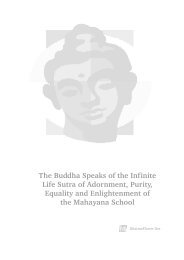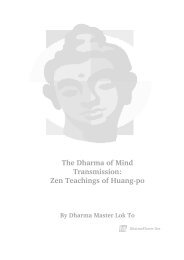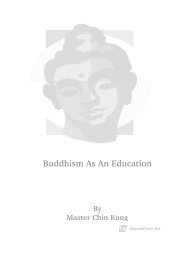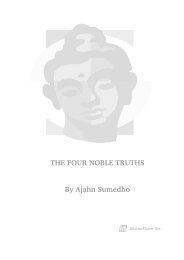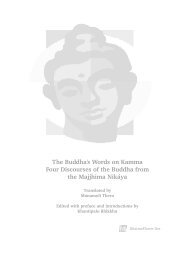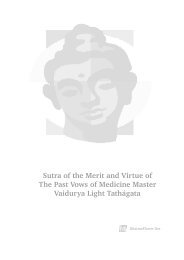Vipassana Meditation : Lectures On Insight Meditation by Venerable
Vipassana Meditation : Lectures On Insight Meditation by Venerable
Vipassana Meditation : Lectures On Insight Meditation by Venerable
Create successful ePaper yourself
Turn your PDF publications into a flip-book with our unique Google optimized e-Paper software.
Chapter SevenThe Five Factors Of A MeditatorIn order that a meditator can make progress in his insight meditation, he musthave five factors.The First Factor is faith. A meditator must have a firm and strong faith inthe Buddha, Dhamma and Sangha, especially in the Dhamma, which includesthe technique of meditation he is practicing.The Second Factor is, he must be healthy both mentally and physically. Ifhe suffers from headaches, reels dizzy or has stomach trouble, gastric or anyother illness, it does not mean he is not healthy. He is considered to be healthyto the extent that he can observe any mental or physical process. The food hetakes must be digestible (i.e. food which does not cause stomach disorders)because if he suffers from indigestion, he will not be able to practice very well.The Third Factor is he must be honest and straightforward. That means hemust not tell lies to his teacher or to his fellow meditators. Honesty is the bestpolicy.The Fourth Factor is energy (uiriya) - not ordinary energy but unwavering,strong and firm energy (padhana). A meditator must have this factor for hissuccess in striving for emancipation. He should never let his uiriya or effortdecrease, but should be perpetually improving or increasing it. When viriya orpadhana is increasing, then mindfulness will become continuous, constant anduninterrupted. When mindfulness becomes continuous, constant anduninterrupted, concentration will become deep and strong. <strong>Insight</strong> will becomesharp and penetrative, resulting in the clear comprehension of the mental andphysical processes in their true nature.The Fifth Factor is paññá or wisdom. Though we use the word paññá it doesnot refer to ordinary paññá or knowledge. It refers to insight knowledge of thearising and passing away of nama and rupa (udayabbaya-nana) which is thefourth stage of insight knowledge. The first stage is Namarupa-paricchedanana(knowledge of the difference between mentality and physicality). Thesecond stage is Paccayapariggaha-nana (knowledge of causality or knowledgeof the Law of Cause and Effect). The third is knowledge of comprehension -Samma-sana-nana. Know ledge of comprehension means knowledge, whichpenetrates and comprehends all the three characteristics of mental andphysical processes, namely, anicca, dukkha and anattá. The fourth stage isUdayabbaya-nana knowledge of arising and passing away of mental andphysical phenomena.So the Buddha said that paññá here refers to that fourth stage of insightknowledge, which penetrates into the appearance, and disappearance ofmentality and physicality. A meditator is expected to possess this factor. In thebeginning, a meditator may not possess this insight knowledge of arising and44



